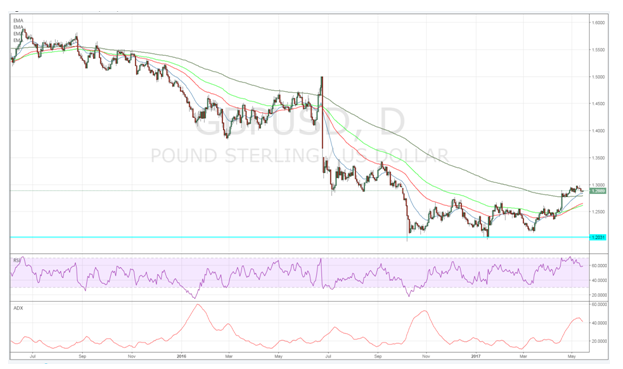Key Points:
- Cable likely to remain bearish in the coming session.
- Support at 1.2830 will be relatively critical.
- Technical factors currently suggesting a corrective move ahead.
The cable had a week in the red as the pair experienced a sentiment swing towards the greenback following the release of a range of stronger U.S. economic data. In addition, the Bank of England also impacted the cable’s prospects following the release of the latest MPC statement that proved to be significantly more dovish than expected. Subsequently, the pair continued to slip lower during the trading week and closed the final session out around the 1.2883 mark. Subsequently, we take a look at what occurred last week with a view to discovering some insight for the coming session.
The cable provided a relatively poor performance last week as the currency reacted to a range of stronger U.S economic data as well as a relatively dovish central bank. In particular, the U.S. JOLTS figures sent the pair reeling, as did the surprisingly strong Unemployment Claims result at 236k. However, it was largely the Bank of England and their dovish outlook on interest rates that did the pair the most damage. The decision was always going to be to keep the official bank rate on hold at 0.25%, but the dovish rhetoric was largely unexpected and saw the cable give up around 60 pips just from the central bank’s statement. Subsequently, the pair closed the trading week out around the 1.2883 mark.

Looking ahead, the cable is in for an exceedingly busy week with the primary focus to fall upon the UK CPI and Core Retail Sales data. In fact, the CPI figures are likely to be very closely watched because of the building inflation that has been evident within the UK economy. Subsequently, this is likely to inform on potential action from the Bank of England incoming MPC meetings. Additionally, the Core Retail Sales figures could also prove illuminating given that they are a good gauge of consumer spending and demand. The forecast has the benchmark rising to 1.0% but we could potentially see a slight uptick in that result. On the U.S. side of the ditch, watch out for the Philly Fed Manufacturing Index, estimated to come in at 19.8.
From the technical perspective, the pair’s recent decline has relieved some pressure from the overbought RSI and Stochastic Oscillator’s. However, the trend is still downward in nature and the 1.2830 support zone could be challenged in the coming week. Subsequently, our bias is bearish given that we are no longer forming higher highs. Support is currently in place for the pair at 1.2830, 1.2754, and 1.2625. Resistance exists on the upside at 1.2986, 1.3121, and 1.3335.
Ultimately, the UK CPI figures are likely to set the fundamental trend for the pair in the week ahead. However, even a strong result will need to contend with the various technical indicators which are all suggesting that the coming week could prove relatively negative for the pair.
